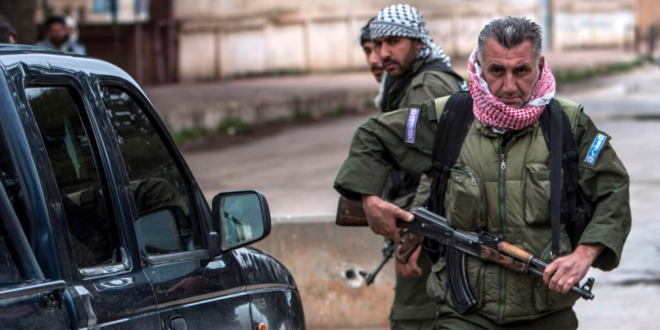Local officials in northeastern Syria said a series of Turkish drone strikes on Wednesday killed and wounded several people in a Kurdish-controlled town near the border with Turkey.
Unlike other attacks carried out by Turkey in recent months, those targeted Wednesday were not Syrian Kurdish fighters. According to local sources, three members of a local Christian militia were killed and two others were wounded in several Turkish drone strikes on the town of Derik in northeastern Syria.
Ankara has not commented on the recent attacks, but Turkey has been targeting areas under the control of the Syrian Democratic Forces, a Kurdish-led military alliance that has been a major U.S. partner in the fight against Islamic State group militants.
Turkey’s attacks have increased in recent months. Turkey views the SDF as an extension of the Kurdistan Workers’ Party (PKK), which is considered a terrorist organization by Ankara and Washington. But the United States makes a distinction between the two Kurdish groups.
According to the Council on Foreign Relations, Turkey “aims to maintain a buffer zone that deprives the PKK of bases abroad and to prevent the emergence of a contiguous area of autonomous Kurdish rule across borders that could intensify calls for an independent state.”
The Christian group that Turkey targeted Wednesday is called Sutoro, a local security force that is part of the Syriac Military Council, itself part of the SDF. Sutoro was founded in 2012 in the wake of Syria’s civil war. It later entered an alliance with Kurdish forces to defend Christians and other communities in northeastern Syria from other armed groups.
Kurdish officials say Christian representation within the SDF is an important indicator of northeastern Syria’s diversity and its autonomous administration.
“Our autonomous administration was founded in 2014, and later when the SDF was established in 2015, Christian groups were the first ones to become part of it because they see themselves are real partners in governing and protecting this part of Syria,” Farhad Shami, a spokesperson for the SDF, told VOA.
Christians made up about 10% of Syria’s prewar population of 23 million. But many of them have left the country since the conflict began in 2011, especially after the rise of Islamist extremist groups.
Experts say Christian forces in northeastern Syria have played a major role in the war against IS, also known as ISIS.
“The Syriac Security Forces (Sutoro) demonstrated heroism in 2015 when they fought ISIS and prevented a massacre of Christians in the Khabur River Valley,” said Myles B. Caggins III, nonresident senior fellow at the New Lines Institute and former spokesperson for the Global Coalition to Defeat ISIS in Iraq and Syria.
He told VOA that such cross-border attacks by Turkey on military targets and civilian infrastructure cause suffering throughout northeastern Syria and weaken the ability to fight IS remnants.
“U.S. troops have trained and advised Syriac Military Council anti-ISIS forces, and it is a tragedy that America’s partners are unjustly killed,” Caggins said.
According to the Rojava Information Center, a pro-Kurdish monitoring group in Syria, Turkey has carried out 76 drone strikes in the northeast since the beginning of the year.
Last year, Turkish Foreign Minister Hakan Fidan said the objective of such attacks was to destroy the organizational infrastructure and sources of income for “terrorist organizations,” referring to Kurdish groups and their partners.
But Amy Austin Holmes, a research professor at George Washington University, said Syrian Christian armed groups and their Kurdish allies don’t pose a threat to Turkey.
“Not only are they not a threat to Turkey, but they actually provide security to Turkey because they defeated ISIS and they protect Turkey’s southern border from other threats,” she told VOA.
 Eurasia Press & News
Eurasia Press & News




